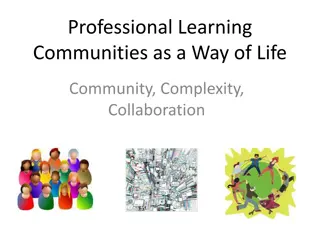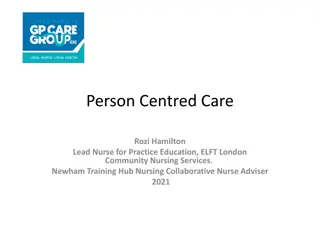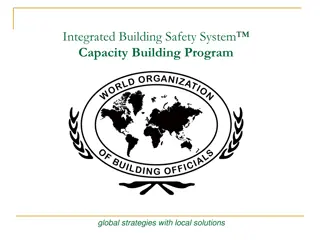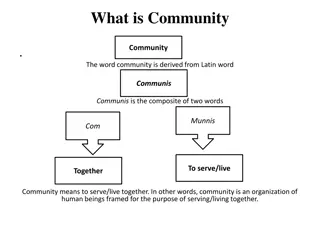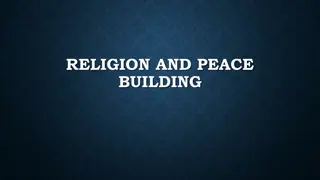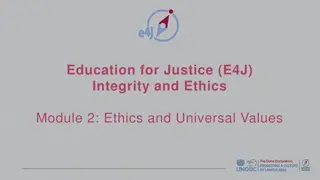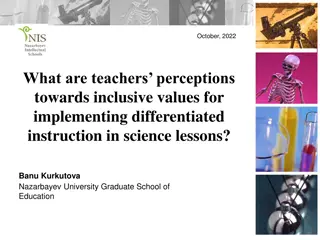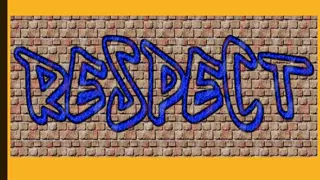The Importance of Values in Building Harmonious Communities
Values play a crucial role in shaping individual behavior, organizational culture, and community interactions. Shared values are essential for promoting harmony, achieving common goals, and fostering mutual respect. When values are not aligned, it leads to conflicts, inefficiencies, and dissatisfaction within families, schools, companies, and society. Establishing and upholding core values is imperative for creating a cohesive and productive community where individuals can thrive and work together effectively.
Download Presentation

Please find below an Image/Link to download the presentation.
The content on the website is provided AS IS for your information and personal use only. It may not be sold, licensed, or shared on other websites without obtaining consent from the author. Download presentation by click this link. If you encounter any issues during the download, it is possible that the publisher has removed the file from their server.
E N D
Presentation Transcript
The importance of values For humans, some things have always been more important than others. That is why we value people, ideas, activities and objects according to their significance in our life. However, the criteria used to give value to those elements is varied .
Values allow the members of an organization to interact harmoniously. Values influence their formation and development as individuals, and make it easier to reach goals that would be impossible to achieve individually. For the well-being of a community, it is necessary to have shared rules that guide the behavior of its members, otherwise the community will not function satisfactorily for the majority.
When families, schools, companies, and society in general function poorly, many times it is due to a lack of shared values, which is reflected in a lack of consistency between what is said and what is done. For example, it is difficult to teach our children tolerance if our leaders and rulers constantly insult those with whom they disagree.
By the same token, its difficult to promote respect . If teachers, professors, bosses, or parents, when faced with complex situations, defend their decisions by saying, Here you do what I say or, Things are like that because I say so .
In practical terms, a community is unlikely to function well, much less perfectly, if its members don t share certain principles that permanently guide the way they relate to each other, in good times and in bad times. The word community means couples, families, the workplace, the classroom, the neighborhood, the city, the country, and any other place where people interact. If we don t share their values, we will neither feel at ease nor function properly in that community, and we ll feel little satisfaction in being a part of it.
In a company organizational culture values are the foundation of employee attitudes, motivations and expectations. Values define their behavior. If valuesdon t have the same meaning for all employees, their daily work will be more difficult and cumbersome. The work environment becomes tense, people feel that they are not all moving in the same direction, and clients pay the consequences.
Being a pillar of a company, values not only need to be defined, they must also be maintained, promoted and disseminated. Only then will workers have a better chance of understanding and using them in their daily activities.
THE IMPORTANCE OF VALUES "If Wealth Is Lost Nothing Is Lost" "If Health Is Lost Something Is Lost" "If Character Is Lost Everything Is Lost" Best Of All Things Is Character.
Remember The CHINESE PROVERB "If There Is Righteousness In The Heart, There Will Be Beauty In Character, If There Is Beauty In Character, There Will Be Harmony In The Home, When There Is Harmony In The Home, There Will Be Order In The Nation, When There Is Order In The Nation There Will Be Peace In The World".
A Person With Proper Values Will Not Be Afraid To Face Problems. He Or She Will Expect And Accept Them As Part Of Life. He Or She Will Not Give Un Necessary Importance To Anything That Happens In Life. He Or She Will Have Complete Faith In God. Such A Person Will Be An Example To The Rest.
Value Crisis at The Individual Level
Crisis of Human Values in the Present Age:- an unstable and dangerous situation affecting an individual, group, community, or whole society. A crisis is any event that is expected to lead to, security, environmental affairs, especially when they occur suddenly, with little or no warning. Crisis are deemed to be negative changes in the economic, political, societal, or or an 'emergency event'. More loosely, it is a term meaning 'a testing time'
Value crisis is one of the burning problems in our daily life. For Example: Women are actually facing existential crisis due to insecurity. ethics, penal code, constitutional and legal norms and people very often utilize freedom in the ultimate sense, consequence upon which we are facing problem in the society. Some people violate social norms, morality and
Everybody is going to fulfill his or her need by utilizing ultimate freedom. to enjoy freedom in the ultimate sense. He or she forgets the responsibility to society and tries present society. This is really a serious value crisis being faced by the the social problems which are deep-rooted in the human society. Therefore, every person should be aware of removing justice, patriotism, humanism, etc. are to be preserved in society in order to regulate human life in a well-ordered manner The values like truthfulness, kindness, honesty, law,
Value-crisis has emerged due to not understanding its proper role in our human society. To some thinkers, epistemological crisis and identity crisis are the two main crises of value which create the major problems like suicide, murder, robbery, extortion, rape, insurgency, or extremist problem and caste and class conflict, etc. The problem of value deterioration in our society can be stored out, if we are socially conscious about the deep-rooted values in our society. This awareness is possible only when we will flourish our philosophizing or spiritualizing force to assess the value in our life. Pertaining to knowledge
Crisis -Any situation that is threatening or could threaten to harm people or property, seriously interrupt operations, damage reputation and/or negatively impact the bottom line. Crisis Intervention individual s life in order to defuse the destructive effects of the unusual stress being experienced, and then assisting the individual in crisis to go back to his or her normal condition before the crisis. -focuses on studying an
Crisis Management - is the expert handling of a situation to reduce or eliminate danger or destruction. Crisis Negotiation - the use of communication techniques and strategies to influence a person to change his/her behavior in accordance with goals within legal, ethical and moral constraints.
Phases of CRISIS Pre-Incident Post- Incident Incident Occurrence CRISIS Post- Occurrence
Phases of a Crisis..Cont 1. Pre-Incident Phase - is the period of time prior to an incident occurring. This Phase consists of the following: A) Prediction - determination of what incident is going to occur and when it is going to occur, is the key to minimizing the effects of the incident.
B)Prevention - the best way to minimize the damage done by an incident is to prevent it from occurring. Not all incidents are preventable like natural disasters. Some preventable incidents may be detected too late to prevent them. C)Preparation - 2 Forms of preparation Preparation of the response designed to prevent the incident Preparation for the incident.
2.Incident Occurrence - is the instance in time at which the incident occurs or starts to occur if it has not been prevented. 3.Post-Occurrence Phase - during this phase, the incident may get worse. This Phase consists of the following: a. Recognition b. Response 1. Initial Response 2. Consolidation 3. Stand down c. Recovery d. Investigation
4. Post-Incident Phase - incident is likely to have a finite lifetime. Most incidents will conclude without intervention. However, without intervention the effects of the incident may be worse or the incident may last longer. This Phase Consist of the following: A)Restoration - once the incident is over, normality returns over a period of time which can take months or years for very severe incidents.
B)Investigation - may be performed after the incident concludes to provide information and evidence for any hearing, inquiries and criminal prosecution. C)Post-Incident Discussion Activities - activities include immediate incident debriefs and other types of incidentdiscussions occurring some time after the incident concludes. The aim of the debriefs is to identify areas for improvement.
Dimensions of Value Crises
A related dimension of the value crisis is the increasing respectability of selfish individualism. It takes the form of exclusive concern for personal gains without any consideration for the common good. In every situation the guiding principle and the main question is, what is in it for me? . Such selfish persons use their friends, parents, relatives, and all other human relationships merely as means for personal advancement, without cherishing them or giving them much in return.
They develop their talents, skills and knowledge,not because they make for a good person or a good society, but only to encash them at the opportune moment for gaining personal advantage. Such encouraged, even admired, by the modern professional and managerial class as the desirable virtues of motivation, goal-orientation, competitive spirit, etc. self-seeking, careerist ambitions are
Another dimension of the value crisis at the individual level is the steep rise in the rights- consciousness, along with a steeper decline in the duty-consciousness. Duty Consciousness Every man is born in the world only as an innocent child. He is brought up, protected, educated, and is infact sustained by the society. So man owes a lot to the society and in turn, he should repay that due to the society by making sacrifice for the latter. The act of returning the due is called "Duty"
The third dimension of this crisis is the common mentality of adopting double standards of value judgment, a much higher one for others and a much lower one for ourselves. Even the smallest mistakes of others do not escape our censorious scrutiny while we casually ignore or explain away our own wrongful conducts and malicious intentions. We refuse to accept any part of responsibility for the evils around us, let alone take initiative to do something about them. This duality of value standards also exhibits itself in the wide gap between profession and practice.
There are many different values in our society today, which how others are treated and how much respect is shown them. Some of the most important values are to treat everyone equally, encourage individual action and initiative, democracy, equal rights, freedom of speech. Some of the wrong values that should be ignored are competitiveness, the "me first attitude", and the "isms" (racism, ageism, and sexism), the "quick fix" mentality, violence, and materialism). The media is the place where the wrong values are often promoted.
All people have the right to their own opinion and the expression of it. Using democracy enables them to express who they want for a ruler of their country in a more civil way. Freedom of speech and expression is also extremely important, and this enables the country to be more diverse. In every Constitution, it says that all men are equal no matter what race, age, or religion. They can speak their minds but they also have the obligation to do it for the good of all people. When you are helping others, you are ignoring the "me first attitude" and working for the good of everyone, not just yourself.
It is a known fact that man, a member of a society Meaning of Values:- Values are generally regarded as the moral standards of human behaviors in the society. It is a kind of quality of humans, which is applied to human activities. Value is a mixture of three concepts such as Idea, Quality and Supervention. Values can be defined as the principles that guide people's lives, and have varying significance. Values are the essence of our personality, and affect us to make decisions, trust people, and arrange our time and energy in our social life. Values may be treated as keys to solving many world problems.
Significance of Human Values:- Human values have been a central concept in the social sciences since their inception. Human values play a vital role in the society, for they are said to be the basis of human beings for leading a better life. It is believed that all holy books of all religions contain the values of good life.
There are different factors which affect human values in the life of an individual and the society. Value education starts from families and it is continuous at schools with the help of educators. Because of this, families, teachers and educational programs are crucial to values education. Families are the first source of information so they should be careful about their behaviors and attitudes as children see them as a model.
What are some of the most important values in today's society? Best Answer: Truth Justice Compassion Forgiveness Grace Love Humbleness







